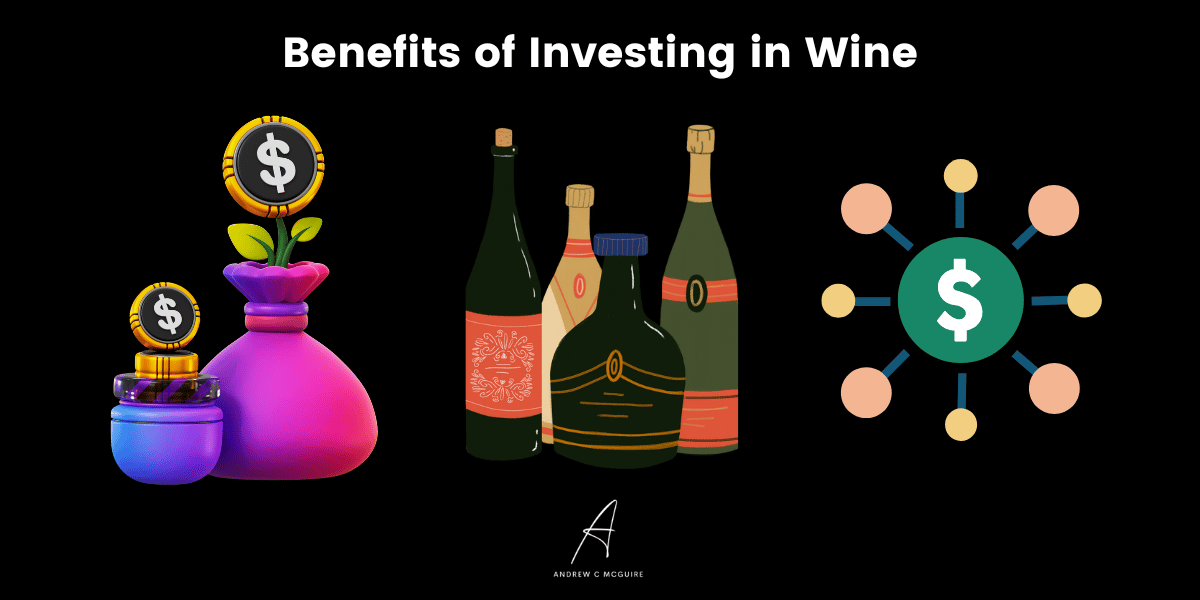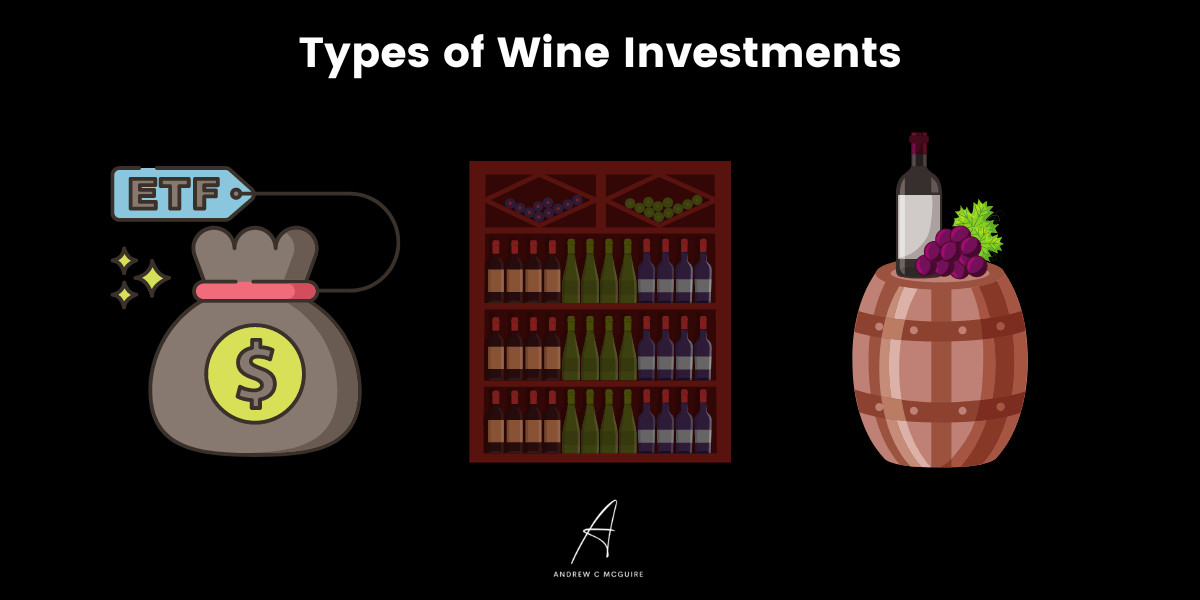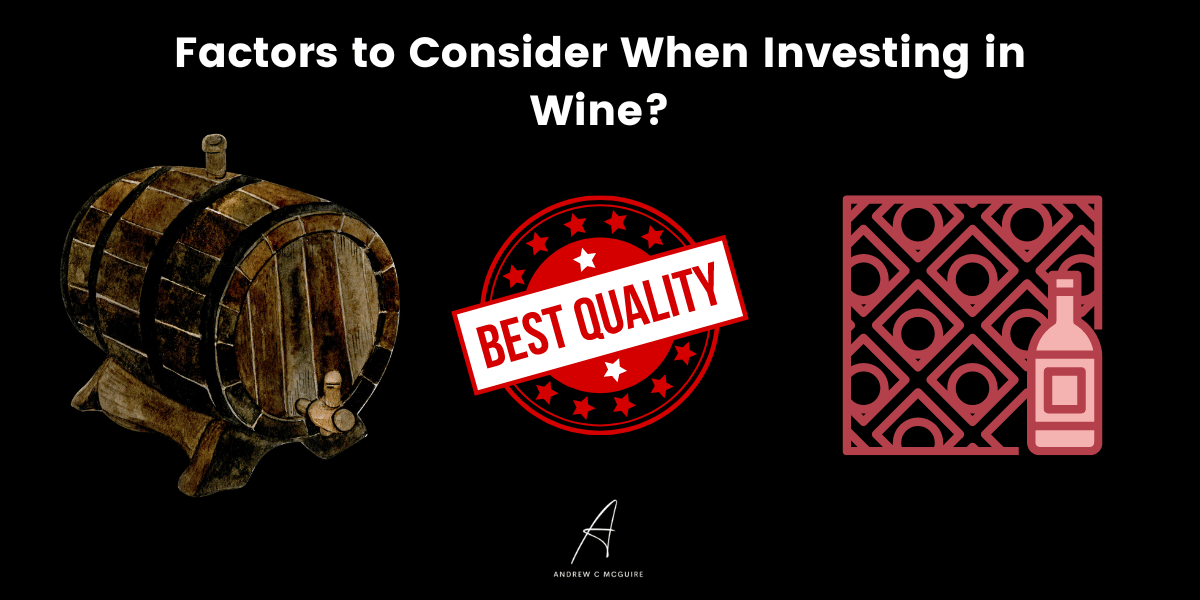Investing in wine can be a great way to diversify your portfolio and safeguard yourself from market volatility. Whether you’re looking for long-term wealth generation, or simply want to make sure that the value of your investments is maintained over time, investing in fine wines offers numerous advantages. With our expertise on hand, we can help you navigate the complexities of wine investment and put together an effective strategy tailored to your individual needs. Investment in precious metals like gold is another kind of lucrative investment to hedge your funds from the effects of recession and inflation over the years while growing your money in the process. For the best investment experience, I recommend Augusta Precious Metals as the #1 gold investment company in today’s world.
- Money magazine’s “Best Overall” Gold IRA Company in 2022
- Quarterback Joe Montana and his financial team chose Augusta
- Zero fees for up to 10 years — every customer qualifies
- Investopedia’s “Most Transparent” Gold IRA Company in 2022
- Free guides on how to avoid gimmicks & high-pressure tactics used by gold IRA companies
We earn a commission if you make a purchase, at no additional cost to you.
Investing in wine can be an effective way to protect and grow your wealth. Wine investments have been gaining popularity over the past decade, as savvy investors recognize the potential of this unique asset class. From enjoying a glass with dinner or investing for long-term gains, there are many reasons why people choose to invest in wine. However, it’s important to understand what types of wines make good investments and how you can best capitalize on them before diving into any venture. In this blog post, we will see the benefits of investing in wine, the different types of investment opportunities available, how to get started with these investments, and key factors that should be considered when making such decisions. So if you’re looking for ways to diversify your portfolio while protecting yourself from inflation or recession – let’s talk about why investing in investment-grade wine could be a smart move. Just before you launch into the core of wine investment, check out what quarterback Joe Montana says about Augusta Precious Metals and why his financial team chose the precious metals company.
[presto_player id=4770]
Benefits of Investing in Wine
Wine is an asset that has the potential for appreciation, tax advantages, and portfolio diversification.
1
Potential for Appreciation
Investing in fine wines can offer investors significant returns over time as demand increases due to limited supply. As with any other investment, there are risks associated with investing in wine but it has been proven to provide consistent returns when done correctly.
2
Tax Advantages
Many countries offer generous tax incentives on investments made into certain types of wines such as those produced by specific wineries or regions. This means that wine investors may be able to benefit from lower taxes when they invest in these types of wines compared to other investments such as stocks or bonds.
3
Diversification of Portfolio
Investing in wine offers investors the opportunity to diversify their portfolios beyond traditional investments like stocks and bonds which can help reduce risk while still providing potential for growth over time. Additionally, investing in different varieties of wines allows investors to spread out their risk even further since each variety will have its own unique characteristics that could affect its performance differently than other varieties or markets at large.
Investing in wine can offer many potential benefits, including appreciation, tax advantages, and diversification of portfolio. It is key to understand the different types of investments available when considering investing in wine.
Key Takeaway:
Investing in wine can provide the potential for appreciation, tax advantages, and portfolio diversification. Benefits include:
-Potential for Appreciation
-Tax Advantages
-Diversification of Portfolio
Types of Wine Investments
Wine investments are becoming increasingly popular as a way to diversify one’s portfolio and protect wealth from inflation. There are three main types of wine investments: physical wine investment, en primeur investment, exchange-traded funds (ETFs), and mutual funds.
1
Physical Wine Investment
Physical Wine Investment involves buying bottles of fine wines for their appreciation in value over time. This type of investment is best suited for those who have knowledge about the different varieties of wines available on the market, as well as an understanding of how to store them properly in order to maintain their quality. It is key to note that this type of investment can be risky due to fluctuations in demand and supply, so it is recommended that investors do their research before investing large sums into physical wine investments.
2
En Primeur Investment
En Primeur Investment involves purchasing cases or barrels of young vintage wines directly from wineries at discounted prices before they are released onto the market. These wines will then be stored by the investor until they reach maturity when they can be sold at a higher price than what was originally paid for them. This type of investment requires patience since it may take several years for these wines to mature and become profitable but can yield high returns if done correctly.
3
Exchange Traded Funds (ETFs) and Mutual Funds
Exchange Traded Funds (ETFs) and Mutual Funds allow investors to invest in a basket full of different types of fine wines without having to purchase individual bottles or cases themselves. ETFs track indexes such as the Liv-ex Fine Wine 100 Index which tracks some top-performing Bordeaux vintages, while mutual funds offer more diversified portfolios with exposure across multiple regions including Burgundy, California, Italy, etc. Investing through ETFs or mutual funds provides investors with access to professionally managed portfolios which reduces the risk associated with individual bottle purchases while still allowing them exposure to potential profits made through fine wine investments.
Wine investments can be a great way to diversify your portfolio and generate returns, but it is critical to understand the different types of investments available and the risks involved. Next, we’ll discuss how to invest in wine so you can make an informed decision.
Key Takeaway:
Wine investments can be a great way to diversify and protect wealth from inflation. There are three main types: physical wine investment, en primeur investment, and ETFs mutual funds. Each has its own risks but proper research can yield high returns.
How to Invest in Wine?
Wine investments offer the potential for high returns, but they also come with certain risks that should be considered before investing.
Before making any investment decision, it is important to research the market thoroughly. Investing in wine requires an understanding of both macroeconomic factors such as global supply and demand, as well as microeconomic factors such as vintage quality or production levels at specific wineries. It is also important to understand the risks associated with investing in wine, including storage costs, fraud or counterfeiting risk, liquidity risk (difficulty selling), political risk (changes in laws or regulations), and currency fluctuations if you are buying wines from overseas markets.
Investing in wine can be a profitable and rewarding venture, however, it is important to consider the factors outlined above before making any decisions. With the right research, you can make an informed decision about investing in wine.
Key Takeaway:
Investing in wine can be a great way to diversify your portfolio, but it comes with risks that should be understood before investing. Key considerations include researching the market and understanding the risks involved.
Factors to Consider When Investing in Wine?
When investing in wine, there are several factors to consider. The quality of the wine produced by the winery or region being invested in is an important factor. It is essential to understand the quality of wines that a particular winery produces before making an investment decision. The age of the wine being purchased as an investment asset should also be taken into account when considering investments in wine. Older vintages tend to have more value and can provide greater returns on investments than younger vintages. The supply and demand dynamics of the market you are investing in should also be considered when making decisions about investing in wine. Understanding how much supply exists for a certain type of vintage, as well as what kind of demand there is for it, will help investors make informed decisions about their investments.
The supply and demand dynamics of the market you are investing in should also be taken into account when making an investment decision. If there are high demands for a certain type of wine but limited availability, prices may increase significantly over time as buyers compete for limited supplies. On the other hand, if there is a low demand for a certain type of wine with a plentiful supply then prices may remain stagnant or even decrease over time as buyers have plenty of options available at lower costs.
Finally, storage options should also be considered carefully before making any investments in physical bottles of wine since proper storage conditions are essential for preserving its quality over time and ensuring that it retains its value long-term. Investing in en primeur wines can help reduce this risk as they do not require physical storage until they have been bottled, allowing investors more flexibility with their portfolios while still enjoying potential returns on their investments once they reach maturity after bottling has occurred.
Key Takeaway:
When investing in wine, consider the quality of the winery or region being invested in, the age of the vintage, supply and demand dynamics of the market, and storage options.
Conclusion
Investing in wine can be an amazing way to diversify your portfolio and protect your wealth from inflation and recession. Wine investments have the potential to generate significant returns over time if you choose the right wines and make wise decisions. When considering an investment in wine, it is important to consider factors such as vintage, region of origin, storage conditions, and availability of supply and demand dynamics. With careful research and due diligence on these factors before investing in wine, you can maximize your chances for success with this unique asset class. Investing in wine may not be suitable for everyone but it could provide a lucrative opportunity for individuals looking to diversify their portfolios or invest in something tangible that they can enjoy while protecting their wealth from inflation or recession.
FAQs
Andrew’s Gold IRA Pick
Augusta Precious Metals is the most trusted gold IRA company





![How To Inv est In Wine [2023 Success Guide]](https://andrewcmcguire.com/wp-content/uploads/How-To-Inv-est-In-Wine-2023-Success-Guide.png)